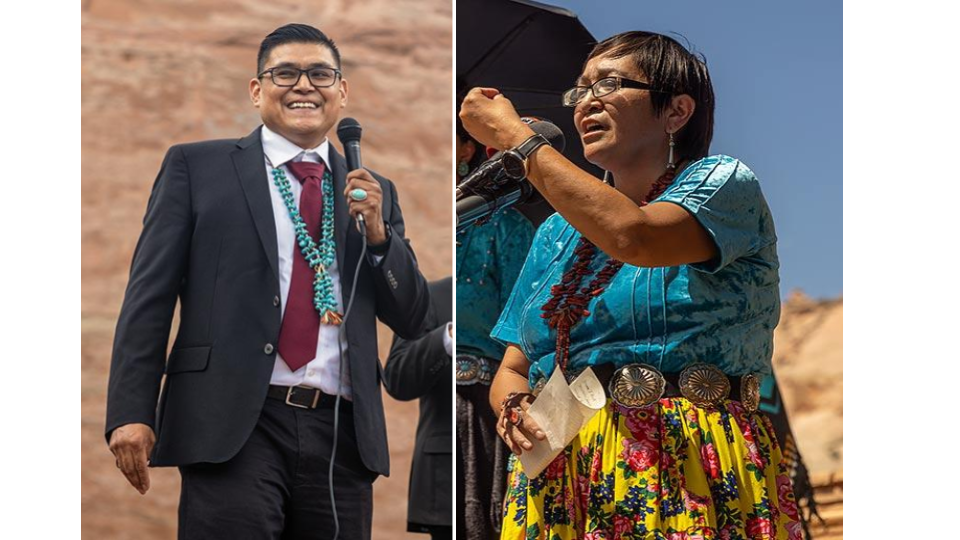
- Details
- By Native News Online Staff
The two candidates running for Navajo Nation president announced their running mates on Monday, according to two reports in the Navajo Times.
Incumbent Jonathan Nez on Monday selected Air Force veteran Chad Abeyta as his running mate. Abeyta, 33, from Alamo, New Mexico, accepted the nomination, which took place at Veterans Memorial Park in Window Rock. His wife, Paulene Abeyta, their children and his mother and father were present.
Abeyta said the top three priorities for the next vice president are to follow the Nahat’á plan the Nez-Lizer administration began, according to a Navajo Times story about the announcement. Abeyta said his second priority is to bring creative solutions to the table, adding, “And the third thing is to support President Nez and his decisions.”
The other candidate for Navajo Nation president, Buu Nygren, announced he has chosen Na’neelzhiin/Star Lake Chapter President Richelle Montoya, 45, as his running mate, according to a Navajo Times story about the announcement.
Nygren said he chose Montoya because the people wanted a woman to be in leadership and his campaign has always been about the voices of the people, the Time story reported. If she and Nygren are elected, Montoya promised to focus on four priorities: chapters, educators, elders, and veterans.
“Too many times, we’ve heard veterans and elders say that they’re just being used for votes and that nobody talks to them anymore,” Montoya told Navajo Times. “I want to be the person that talks to them, that listens to them, and brings their concerns and their questions back to OPVP (Office of the President and Vice President) so that Dr. (Buu) Nygren can help, along with the executive directors, to get their needs met.”
Nygren made the announcement about Montoya joining his ticket at Navajo Veterans Memorial Park, where incumbent Nez had made his selection known earlier in the day. Montoya was accompanied by her husband, Olsen Montoya, and two of her children.
More Stories Like This
Native News Weekly (August 25, 2024): D.C. BriefsUS Presidents in Their Own Words Concerning American Indians
Indigenous Actor Elaine Miles Reports Detention by Alleged ICE Agents
Happy Thanksgiving from Native News Online
Coming Up on Native Bidaské: Behind the Animation: Joey Clift Talks “Pow” and Native Storytelling
Help us tell the stories that could save Native languages and food traditions
At a critical moment for Indian Country, Native News Online is embarking on our most ambitious reporting project yet: "Cultivating Culture," a three-year investigation into two forces shaping Native community survival—food sovereignty and language revitalization.
The devastating impact of COVID-19 accelerated the loss of Native elders and with them, irreplaceable cultural knowledge. Yet across tribal communities, innovative leaders are fighting back, reclaiming traditional food systems and breathing new life into Native languages. These aren't just cultural preservation efforts—they're powerful pathways to community health, healing, and resilience.
Our dedicated reporting team will spend three years documenting these stories through on-the-ground reporting in 18 tribal communities, producing over 200 in-depth stories, 18 podcast episodes, and multimedia content that amplifies Indigenous voices. We'll show policymakers, funders, and allies how cultural restoration directly impacts physical and mental wellness while celebrating successful models of sovereignty and self-determination.
This isn't corporate media parachuting into Indian Country for a quick story. This is sustained, relationship-based journalism by Native reporters who understand these communities. It's "Warrior Journalism"—fearless reporting that serves the 5.5 million readers who depend on us for news that mainstream media often ignores.
We need your help right now. While we've secured partial funding, we're still $450,000 short of our three-year budget. Our immediate goal is $25,000 this month to keep this critical work moving forward—funding reporter salaries, travel to remote communities, photography, and the deep reporting these stories deserve.
Every dollar directly supports Indigenous journalists telling Indigenous stories. Whether it's $5 or $50, your contribution ensures these vital narratives of resilience, innovation, and hope don't disappear into silence.
 The stakes couldn't be higher. Native languages are being lost at an alarming rate. Food insecurity plagues many tribal communities. But solutions are emerging, and these stories need to be told.
The stakes couldn't be higher. Native languages are being lost at an alarming rate. Food insecurity plagues many tribal communities. But solutions are emerging, and these stories need to be told.
Support independent Native journalism. Fund the stories that matter.
Levi Rickert (Potawatomi), Editor & Publisher

